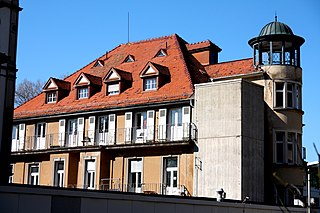Related Research Articles

Neuroscience is the scientific study of the nervous system, its functions and disorders. It is a multidisciplinary science that combines physiology, anatomy, molecular biology, developmental biology, cytology, psychology, physics, computer science, chemistry, medicine, statistics, and mathematical modeling to understand the fundamental and emergent properties of neurons, glia and neural circuits. The understanding of the biological basis of learning, memory, behavior, perception, and consciousness has been described by Eric Kandel as the "epic challenge" of the biological sciences.
Maastricht University is a public research university in Maastricht, Netherlands. Founded in 1976, it is the second youngest of the thirteen Dutch universities.
Fred "Rusty" Gage is an American geneticist known for his discovery of stem cells in the adult human brain. Gage is a former president (2018–2023) of the Salk Institute for Biological Studies, where he holds the Vi and John Adler Chair for Research on Age-Related Neurodegenerative Disease and works in the Laboratory of Genetics.
The Dana Foundation is a private philanthropic organization based in New York dedicated to advancing neuroscience and society by supporting cross-disciplinary intersections such as neuroscience and ethics, law, policy, humanities, and arts.

Sir Colin Blakemore,, Hon was a British neurobiologist, specialising in vision and the development of the brain. He was Yeung Kin Man Professor of Neuroscience and senior fellow of the Hong Kong Institute for Advanced Study at City University of Hong Kong. He was a distinguished senior fellow in the Institute of Philosophy, School of Advanced Study, University of London and Emeritus Professor of Neuroscience at the University of Oxford and a past Chief Executive of the British Medical Research Council (MRC). He was best known to the public as a communicator of science but also as the target of a long-running animal rights campaign. According to The Observer, he was both "one of the most powerful scientists in the UK" and "a hate figure for the animal rights movement".

The Decade of the Brain was a designation for 1990–1999 by U.S. president George H. W. Bush as part of a larger effort involving the Library of Congress and the National Institute of Mental Health of the National Institutes of Health "to enhance public awareness of the benefits to be derived from brain research".

Philip E. Rubin is an American cognitive scientist, technologist, and science administrator known for raising the visibility of behavioral and cognitive science, neuroscience, and ethical issues related to science, technology, and medicine, at a national level. His research career is noted for his theoretical contributions and pioneering technological developments, starting in the 1970s, related to speech synthesis and speech production, including articulatory synthesis and sinewave synthesis, and their use in studying complex temporal events, particularly understanding the biological bases of speech and language.
Science outreach, also called education and public outreach or simply public outreach, is an umbrella term for a variety of activities by research institutes, universities, and institutions such as science museums, aimed at promoting public awareness of science and making informal contributions to science education.

The Centre for Neuroscience and Cell Biology (CNC) is a nonprofit research institute founded in 1990, aiming to foster research in biomedicine and biotechnology and multidisciplinary graduate teaching at the University of Coimbra. CNC was the first established “Laboratório Associado” in Portugal, and it has steadily increased the scope of scientific competences over the years, with a strong focus on the exploitation of the fundamental mechanisms of ageing and brain diseases.
The British Neuroscience Association (BNA) is a scientific society with around 2,500 members. Starting out as an informal gathering of scientists meeting at the Black Horse Public House in London to discuss brain-related topics, on the 23rd of February 1968 it was formerly established as the Brain Research Association, and subsequently relaunched as the British Neuroscience Association in 1997.
USC Shoah Foundation – The Institute for Visual History and Education, formerly Survivors of the Shoah Visual History Foundation, is a nonprofit organization dedicated to making audio-visual interviews with survivors and witnesses of the Holocaust and other genocides, a compelling voice for education and action. It was established by Steven Spielberg in 1994, one year after completing his Academy Award-winning film Schindler's List. In January 2006, the foundation partnered with and relocated to the University of Southern California (USC) and was renamed the USC Shoah Foundation – The Institute for Visual History and Education. In March 2019, the institute opened their new global headquarters on USC's campus.
The Academy of Neuroscience for Architecture (ANFA) is a nonprofit organization whose mission is to promote and advance knowledge that links neuroscience research to a growing understanding of human responses to the built environment.

The Center for Neurotechnology (CNT) is an Engineering Research Center funded by the National Science Foundation to create devices to restore the body's capabilities for sensation and movement. The National Science Foundation has awarded the CNT $~30 million since 2011.

MediaSmarts is a Canadian non-profit organization and registered charity based in Ottawa, Ontario, that focuses on digital and media literacy programs and resources. In particular, the organization promotes critical thinking via educational resources and analyzes the content of various types of mass media.
Neuronus Neuroscience Forum is an annual conference organized at the Jagiellonian University in Kraków (Poland) for young researchers from diverse subdiscplines of neuroscience. Most of the topics cover neurobiology, cognitive and affective neuroscience, as well as clinical neuroscience and neurology.
The International Neuroethics Society (INS) is a professional organization that studies the social, legal, ethical, and policy implications of advances in neuroscience. Its mission is to encourage and inspire research and dialogue on the responsible use of advances in brain science. The current INS President is Joseph J. Fins, MD.
The International Brain Bee (IBB) is a neuroscience competition for teenagers. The IBB was founded in 1999 by Norbert Myslinski, and consists of over 200 chapters in more than 50 regions on 6 continents. Its purpose is to help treat and find cures for brain disorders by inspiring and motivating students to pursue careers in basic and clinical neuroscience.

The Bernstein Center Freiburg (BCF) is the central facility for experimental and theoretical research in the areas of computational neuroscience and neurotechnology at the University of Freiburg. As a member of the national network for computational neuroscience (NNCN), founded by the Federal Ministry of Education and Research (BMBF) in 2004, the BCF is one of a total of six Bernstein Centers in Germany. Like the other Bernstein Centers, it was named after the German physiologist Julius Bernstein. The BCF is located in the former Institute of Brain Research ("Neurophys") in Freiburg-Herdern. Initially known as Bernstein Center for Computational Neuroscience Freiburg (BCCN), the institute was renamed Bernstein Center Freiburg in 2010. The coordination site for the national Bernstein Network resides in the building of the Bernstein Center Freiburg.
The Deutsche Neurowissenschaften-Olympiade is a series of competitions for students in grades 8 to 13, aimed at promoting interest in neuroscience. The competition takes place at two levels: city and national. Each competition is in question and answer format and conducted in English. The winner of the national German Neuroscience Olympiad will represent Germany at the International Brain Bee competition.
References
- ↑ Brain Awareness Week at Duke University of Brain Studies Archived March 14, 2015, at the Wayback Machine
- ↑ Brain Awareness Week at Oxford University
- ↑ Brain Awareness Week @ Springer
- ↑ Brain Week. The Neurological Foundation of New Zealand
- ↑ "Project Encephalon Brain Awareness Week". Project Encephalon. Retrieved 27 January 2022.